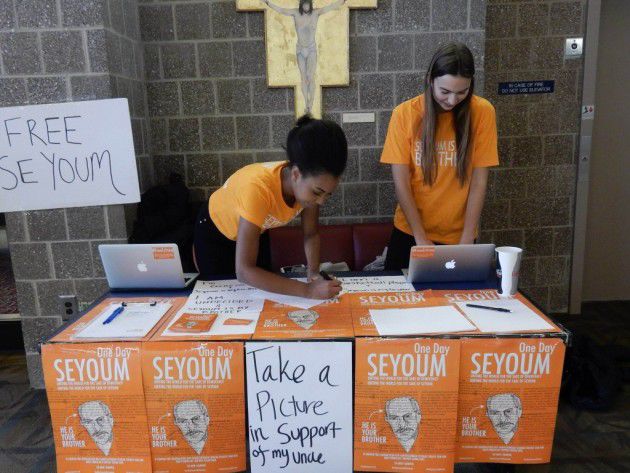One Day Seyoum gains support
February 16, 2016
Freshman Vanessa Berhe has been telling her uncle’s story since she was little. Her uncle, Seyoum Tsehaye, was imprisoned in 2001 by the Eritrean government for promoting democracy and challenging the government. When she was sixteen, Berhe decided to do something about it. She started One Day Seyoum, an organization that aims to free all journalists in Eritrea by spreading awareness. Berhe launched a photo campaign called “Share His Story” in Connelly Center on Monday.
Students made signs that said, “Seyoum is my brother.” They took pictures and posted the photos on social media. Berhe hopes that others will see the photos online and want to learn more about her uncle.
“I was hoping to reach out to different students,” Berhe said. “By seeing us in Connelly, they might be able to identify us elsewhere on campus. It’ll put the seed in their head and hopefully help us grow.”
Eritrea is a small country in East Africa. It fought a thirty-year civil war for independence from Ethiopia. After independence in 1933, only a few private newspapers remained. By 2001, all independent news outlets were abolished. Today, Ertirea is one of the most secretive countries in the world. Little information leaves the country and freedom of speech is repressed. State-run media accuses any opposition to the government and Western countries of collaborating with the country’s greatest enemy, Ethiopia. Since independence, the People’s Front for Democracy and Justice has been the only legally sanctioned political party.
Berhe has family members in Eritrea who are trying to get out. 5,000 refugees leave Eritrea every month. The borders are closed so they must flee at night under threat of gunfire. If they make it out of the country, many refugees settle in neighboring Ethiopia or Sudan. Some cross through the Sahara Desert to get to Libya. From there they illegally cross the Mediterranean to Europe. Many Eritreans drown during the voyage. ISIS’s invasion of Libya has made the journey even more dangerous.
Tsehaye worked to bring peace to Eritrea. He was a photojournalist during the war. After Eritrea won independence, he helped create the state’s first TV channel. However, his democratic views forced him to leave his work with the government and become a freelance journalist. In 2001, he wrote an article encouraging the government to communicate with the people. He was arrested and imprisoned without trial.
Tsehaye is currently being held in Eiraeiro prison in the desert. The prisoners are exposed to extreme cold at night and extreme heat during the day. Many prisoners have died from illness. Tsahaye is over sixty years old and has been living under these conditions for fourteen years.
In Eritrea, prison guards are just as captive as the prisoners. They are not allowed to leave the prison or communicate with prisoners. Some guards have fled the country and reported that out of the ten incarcerated journalists, only four are still alive.
Runa Neely has been working with One Day Seyoum since August 2015. She handles the organization’s Instagram account.
“This issue is so important and no one knows about it,” Neely said. “I want to spread Seyoum’s story so that people will look outside of their own bubbles and see that the world needs help.”
Berhe has been lobbying in Sweden, the European Union and the United States for the release of prisoners of conscience in Ertirea. She hopes that a member of the House of Representatives will sponsor Tsahaye through the Tom Lantos Commission’s Defending Freedoms Project. She plans to put more pressure on state representatives by spreading her uncle’s story to Villanova and local universities.
Berhe started One Day Seyoum in her home country, Sweden, while she was in high school. She reached out to a university that specializes in film. A student agreed to make a documentary about Eritrea for free. With help from journalists, she began spreading the story. One Day Seyoum launched in January 2014 and since then has become an international organization.
One Day Seyoum has only been on campus since August 2015, but the members have already gathered 500 signatures to free Eritrean journalists. Berhe says that these signatures are essential to the movement.
“It’s always good to have a number,” Berhe said. “When newspapers ask how big we are, I can tell them the number of people who signed the petition. When we try to file a lawsuit against the Eritrean government, we’ll have a list of people who support the lawsuit.”
Since creating One Day Seyoum, Berhe has collected around 5000 signatures.
One Day Seyoum plans to hold more events on campus this semester, including a screening of a documentary about Eritrea. Berhe and other members of the organization will be in Connelly all week collecting signatures, and are also planning to augment the group’s social media presence.
“We have so much liberty. But my uncle is imprisoned because he fought for the basic rights of the Eritrean people,” Berhe said.”If I tell his story, then people at least have the chance to help.”
Photo courtesty of Runa Neely.











